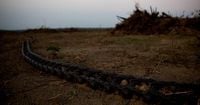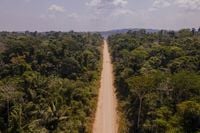Brazil’s Amazon rainforest, often described as the planet’s lungs, is facing a fresh wave of uncertainty after the country’s competition authority, CADE (Administrative Council for Economic Defense), suspended the Amazon Soy Moratorium (ASM) on August 19, 2025. Just two days later, on August 21, the Moratorium was officially lifted, effectively opening the door for soy-driven deforestation in one of the world’s most critical ecosystems. The move, which has sent shockwaves through environmental circles and the global agricultural market, comes after CADE launched a full investigation into alleged anti-competitive practices among the Moratorium’s signatories.
Since its inception in 2006, the Amazon Soy Moratorium had been a voluntary but powerful pact. Backed by major soy trading companies such as ADM, Amaggi, Bunge, Cargill, Cofco, and Louis Dreyfus, as well as industry groups like Abiove and Anec, the ASM prevented the purchase of soy grown on land in the Amazon that had been cleared after July 2008. The agreement was widely celebrated for its role in helping to reduce Amazon deforestation by more than 80% over the last two decades, according to Mighty Earth. Its success made it a global reference point for using market forces to drive conservation while still supporting agricultural expansion.
But this landmark agreement came under fire when CADE argued that the ASM’s system of monitoring and information-sharing might amount to the exchange of sensitive commercial data, potentially giving participating companies an unfair advantage. The regulator also questioned whether the Moratorium excluded certain farmers who, despite being compliant with Brazil’s Forest Code—the country’s primary legal framework for land use and conservation—were unable to participate in the lucrative soy market. Citing these concerns, CADE suspended the ASM and gave soy traders and industry associations just 10 days to comply or face hefty fines.
Environmentalists and many international observers have decried the suspension and subsequent lifting of the Moratorium as a dangerous step backward. João Gonçalves, Senior Director for Brazil at Mighty Earth, didn’t mince words: “The suspension of the Amazon Soy Moratorium paves the way for further deforestation in one of the planet’s most vital ecosystems, pushing it ever closer to an irreversible tipping point, where it becomes a carbon source, rather than a carbon sink. Without this safeguard, soy expansion could drive forest destruction not only in the Amazon, but also in its neighbor Cerrado and in the Pantanal.”
Indeed, the stakes are immense. The Amazon, Cerrado, and Pantanal biomes are not just national treasures but global assets vital to biodiversity and the fight against climate change. The ASM’s track record of aligning agricultural expansion with forest protection had inspired similar international frameworks for sustainable sourcing. Its abrupt end now threatens to undermine years of progress on climate commitments and could erode consumer confidence in sustainable agriculture worldwide.
Yet, not everyone is mourning the Moratorium’s demise. Brazil’s largest soy farmers’ association, Aprosoja-MT, has publicly supported CADE’s decision. In a statement quoted by Reuters, the group said: “For years, the Moratorium excluded producers who were already compliant with the Forest Code. This is a victory for fairness and for Brazilian farmers.” For many in the farming community, the ASM was seen as an extra hurdle, one that penalized those who had already made efforts to comply with national regulations. They argue that the lifting of the Moratorium levels the playing field and allows compliant producers to compete more effectively in both domestic and international markets.
However, this perspective is not universally shared. Global soy traders, who have long relied on the ASM as a guarantee of deforestation-free sourcing, are now voicing serious concerns. One senior executive at a major soy exporter told Reuters: “Without the Moratorium, Brazil risks losing access to markets that demand deforestation-free products.” This sentiment reflects the growing importance of sustainability standards among consumers and regulators in Europe, North America, and Asia, where environmental credentials are increasingly tied to market access. The potential for Brazil to lose its competitive edge in these markets is a real and present danger.
The timing of this decision could hardly be more critical. With the climate COP summit scheduled to take place in the Amazon region later in 2025, Brazil’s environmental policies are under intense international scrutiny. The lifting of the ASM sends a mixed message: on one hand, it signals a willingness to prioritize short-term economic interests; on the other, it risks Brazil’s reputation as a leader in sustainable agriculture and forest protection.
Critics of CADE’s ruling argue that framing the ASM as anti-competitive misses the broader picture. The Moratorium was a voluntary, multi-stakeholder agreement supported by government agencies, civil society, and the global market. Its aim was not to stifle competition, but to ensure that economic development did not come at the expense of irreplaceable natural resources. As Brenda Diniz and João Gonçalves wrote in their August 19, 2025 article, “Would you entrust your future to the industry most responsible for deforestation? That is precisely what is at stake with the decision by Brazil’s competition authority CADE to suspend the Amazon Soy Moratorium.”
Now, the real cost of this decision may be borne by the forests themselves, local communities, and, ultimately, the global climate. The Amazon’s role in pulling carbon from the atmosphere is crucial in mitigating the worst effects of global heating. Allowing deforestation-linked soy into international markets could weaken global efforts to curb climate change and set a precedent that undermines voluntary conservation pacts elsewhere.
As the dust settles, Brazil finds itself at a crossroads. Will the country align its powerful agribusiness sector with global sustainability standards, or will it trade away long-term planetary health for short-term economic gain? The answer will reverberate far beyond Brazil’s borders, shaping the future of environmental governance and market-driven conservation for years to come.
In this moment of uncertainty, governments, corporations, and consumers alike must grapple with the consequences of this pivotal decision. The fate of the Amazon—and, by extension, the world’s climate—hangs in the balance.


